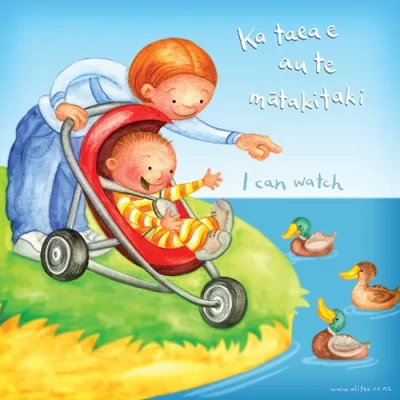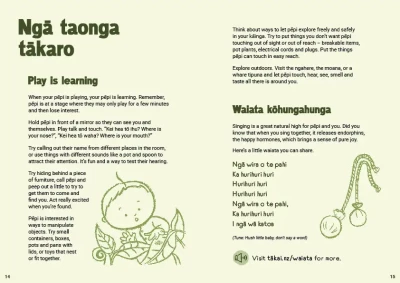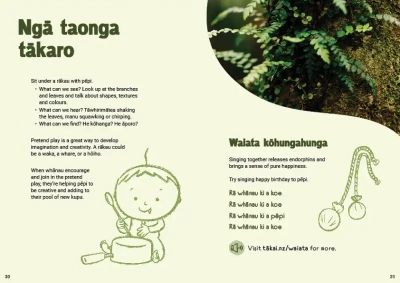
Making outside safe and fun for baby
Babies have fun and learn from being outside. Parents need to think about ways they can make outside safe for baby at home and during outings.
Having some time outside is important for all the whānau – fresh air, sunshine, a little bit of rain or wind. A change of scene can be refreshing and relaxing, which always helps when parenting.
Ask whānau:
- How are you and baby doing since I last saw you?
- Have you had much time outside together?
- How was that?
- How did baby respond?
As adults we forget sometimes what opportunities there are for a young mind to enjoy and learn from in the great outdoors. Having fun together, including having interesting experiences every day, is a great way to keep building the family’s relationship with baby.
Touching trees, grass and flowers and seeing the sky, clouds, birds, butterflies, caterpillars and snails can all be a great adventure for baby. Even a daily walk outside to check the mail can be exciting for a little one. And when parents talk about what they’re doing and seeing, it becomes a rich (multi-sensory) learning opportunity.
Outdoor places for baby to play
In the Whakatipu booklet Te Pihinga 2, the ‘Ngā taonga tākaro ’ sections (pages 14–15 and 30–31) give examples of play activities and how they contribute to learning. Playing is important for baby and even at this young age, baby enjoys playing outside.
- What sort of outside places do you remember enjoying when you were a child?
- What outdoor places have you thought about taking baby to experience?
Use some of the conversation starters below to help parents think about ways they can safely share the outdoors with their baby.
- What do you like to do with baby when you’re outside?
- What does baby like to do with you out there?
- Are there things you do together outside every day?
- Are there places you go for special treats?
- How does baby show you what they like to look at?
- Have you noticed where they like you to take them?
- Is there a safe place for them to be on the ground outside?
- What would you need to do to create a safe place?
Give the backyard a check
- Shall we take a look outside and see how baby might enjoy being out there?
- Is there a shady place for hot sunny days?
- Do you have sun hats and sunscreen?
- What things might be in reach if baby is moving around?
- What plants are nearby?
- Do you know if any nearby plants are poisonous?
- Where could you find information about them?
- Is there any cat or dog poo around, or has there been in the past?
Safe to explore?
- What sort of fencing and gates are there?
- Could baby get to a driveway?
- Are there any water containers around that could be a drowning risk for baby?
- Is there anything you’d like to change about your outside space, or your routine, so that baby can spend more time safely outside?
- What things might you do over the next few days or weeks to make outside safer and more fun for baby?
- Who else could you ask to help – your parent, friend or auntie?
Planning ahead
Not all places are safe or suitable for a baby, so parents might think about and plan for some other places they want to take baby. For example, a sandy beach might not be suitable for pushing a buggy on – and how do we stop baby from eating handfuls of sand and shells?
- What other outdoor places could you take your baby to visit?
- What about when you visit friends and family – are there places that you don’t feel baby is safe?
- Why is that?
Growing a garden
Whānau might be interested in growing a small vegetable garden in the backyard to have inexpensive fresh food. Or a flower garden can add colour and interest to their yard. If the outdoor area is unsuitable, suggest growing plants in buckets or pots. These have the advantage of being transportable if the whānau is transient.
Growing food at home can also help older children to understand about care and nurture of plants for food.
- Have you ever thought about starting your own garden?
- Do you have any friends or whānau who do, and could give you some ideas?
Other resources
- New Zealand National Poisons Centre emergency telephone service – 0800 POISON or 0800 764 766 24 hours a day, 7 days a week
- Otago University non-urgent poisons information – phone (03) 479 1200 between 9am and 5pm (weekdays only) Email: poisons@otago.ac.nz
Helpful resources for whānau
-
Nature For Infants and Toddlers<
Nature For Infants and Toddlers














